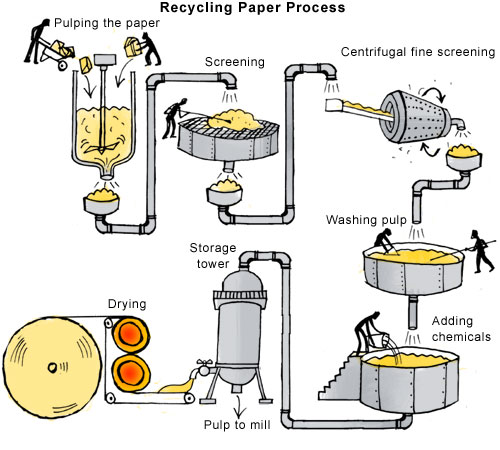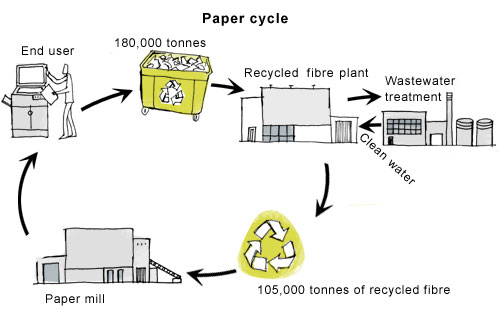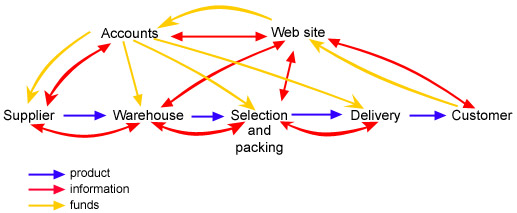
In this unit you will review the following points:
- Useful vocabulary: Industrial processes
- Editing content
- Editing style
- Avoiding repetition
- Improving cohesion
- Checking spelling
- Tips for Task 1
1. Useful vocabulary: Industrial processes.
Match the words associated with processes to the definitions.
3. Editing content.
Look at the Task 1 question and diagrams below. Then read a student's answer to the question. Select the parts that are irrelevant or inaccurate, or that contain information which is not given in the diagrams. (There are eight of them.)
Writing Task 1
You should spend about 20 minutes on this task.
The diagrams below show how paper is recycled.
Summarise the information by selecting and reporting the main features and making comparisons where relevant.
Write at least 150 words.


4. Identifying problems with style.
Look at the answer with the incorrect information deleted. What is the problem with the style?
First, in the recycled fibre plant, they put the used paper in a container, they mix the paper with water, and they pulp the paper. Second, someone screens the pulp to remove larger objects. Then they do centrifugal fine screening to remove smaller, unwanted particles such as dust. Next, the workers wash the pulp, and someone else adds chemicals to the pulp. Finally, the pulp is stored until they need it in the storage tower.
The pulp is sent to the paper mill when they need it. The paper mill uses the pulp to make new paper. They send the new paper to the end user. After using the paper, people send the paper to the recycled fibre plant to be recycled. Paper can be used and recycled like this in a continuous cycle. One hundred and eighty tonnes of used paper makes 105 tonnes of recycled fibre. Water is recycled. The pipes send wastewater from the recycled fibre plant to the wastewater treatment plant and they return clean water to the recycled fibre plant.
5. Editing style.
Complete the second draft of the answer using the passive form of the verb to make the text more impersonal. If you want, you can look at the previous version of the answer.
First, in the recycled fibre plant, they put the used paper in a container, they mix the paper with water, and they pulp the paper. Second, someone screens the pulp to remove larger objects. Then they do centrifugal fine screening to remove smaller, unwanted particles such as dust. Next, the workers wash the pulp, and someone else adds chemicals to the pulp. Finally, the pulp is stored until they need it in the storage tower.
The pulp is sent to the paper mill when they need it. The paper mill uses the pulp to make new paper. They send the new paper to the end user. After using the paper, people send the paper to the recycled fibre plant to be recycled. Paper can be used and recycled like this in a continuous cycle. One hundred and eighty tonnes of used paper makes 105 tonnes of recycled fibre. Water is recycled. The pipes send wastewater from the recycled fibre plant to the wastewater treatment plant and they return clean water to the recycled fibre plant.
6. Avoiding repetition.
TIP:
It is important to avoid unnecessary repetition in your answer. You can do this by using:- ellipsis (leaving out unnecessary words)
- substitution (using pronouns)
- synonyms (using different words with similar meanings)
Choose the best option.
7. Improving cohesion.
TIP:
You can improve the cohesion of a text (how easy it is to read and understand) by linking the ideas and information that it contains.Complete the text using the words and phrases.
8. Checking spelling.
Select the words that are spelled incorrectly. There are 14 of them. Can you find them all?
As shown in the diagram of a recycled fibre plant, the process of paper recycling is as follows:
11. Practice question.
Read the instructions and write your answer. Remember to:
- edit for content.
- edit for style.
- use substitution, ellipsis and synonyms to avoid repetition.
- edit your answer to improve cohesion.
- read your answer carefully to check for spelling mistakes.
Writing Task 1
You should spend a maximum of 20 minutes on this task.
The diagram below shows the supply chain of an online bookshop.
Summarise the information by selecting and reporting the main features.
Write at least 150 words.

When you have completed the writing task, you can look at a sample answer. Compare the sample answer with your own.
The diagram shows the flow of products, information and funds in the supply chain of an online bookshop.
As well as the linear progress of the product, from supplier to customer via the warehouse, selection and packing process, and delivery service, there is a more complicated transfer of information and funds within the supply chain.
Funds originate with the customer and are sent to accounts via the Web site in exchange for a purchase. This money is then used to pay the costs of the company: paying the supplier for the product, the warehouse for storage, the selection and packing department for their services, and also the delivery costs.
The customer receives all the information related to their purchase from the Web site, which then communicates with the accounts and selection and packing departments, and the warehouse. There is a further flow of information where the supplier exchanges messages with the accounts department and the warehouse, while the selection and packing department communicates with both the warehouse and the delivery service.